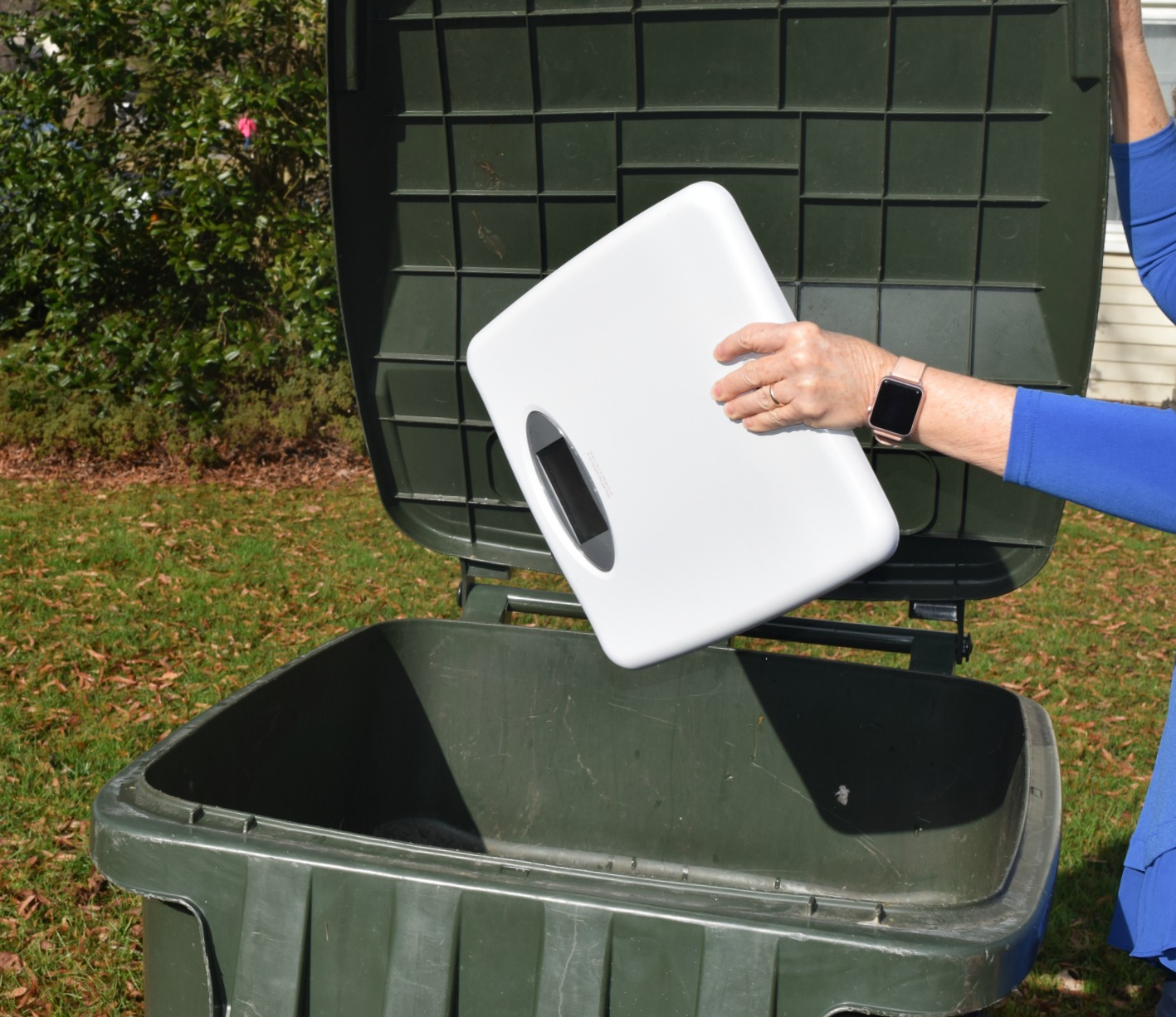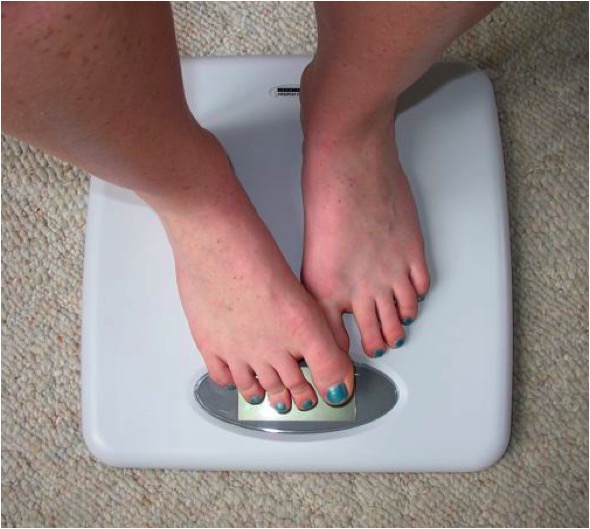5 Things To Know Before You Weigh Yourself
Here are 5 critical things to know if you ask yourself, “why does my weight go up and down.” You’ll spend less time freaking out if you know these things before you weigh yourself.
“Whaat? I was 2 pounds lighter yesterday! What the heck did I eat that made me gain weight overnight?”
Woah! Not so fast. I hear that panic. I’ve been there too. What weight-conscious person hasn’t been there one or two or a hundred times?
Don’t go blaming yourself. Or last night’s meatloaf and mashed potatoes. You did not put down 2 pounds of body fat since yesterday.
So why is the scale up? And why do I say don’t panic?

The shock of the scale can send a shot of adrenaline. Weight fluctuations have you asking “why does my weight go up and down?” © Can Stock Photo / zdenkamicka
What to know before you weigh yourself
5 reasons you see weight fluctuations
- You’ve been less attentive to your eating plan. The most obvious reason your weight is up is you ate too much. But the obvious answer isn’t always the right answer. If your weight is up a pound or two overnight, it’s not from chowing down too much. Most likely, you’re seeing a normal weight fluctuation.
- Your sodium intake is up. I never weigh myself after a day of salty food. The number on the scale is as bloated as I am. By the way, restaurant food is almost always saltier than home cooking. Extra sodium makes your body temporarily hold more fluid, and that shows up as extra weight. Again, normal weight fluctuations.
- Your carb intake is up. Whether you enjoy extra fruit, brown rice or an ice cream sundae, extra carbs fill the liver and muscles with glycogen. And glycogen loves to hold water!
- You haven’t had a bowel movement. No explanation necessary.
- Your hormones shift. A woman can expect to see a couple of pounds of fluid changes because of her menstrual cycle.
Wondering about exercise and weight loss? Here’s what you need to know.
Should you weigh yourself?
Yes: If the number on your scale – whatever that number is – offers information and feedback to your weight control efforts, weighing yourself is helpful. But if the number judges you or dictates your mood, don’t weigh yourself. No bathroom scale knows piddly about your worthiness, character or the type of day you’ll have. If you can’t yet prevent the scale from passing judgment, throw your scale out or hide it under the bed.

Should you weigh yourself – ever?
Did brushing your teeth make you lose weight?
Imagine stepping on the scale before you brush your teeth in the morning and again after brushing your teeth. Woah! How did you lose weight in less than 3 minutes? You step off the scale and on again.
Please, please say it’s true! Let teeth brushing be the magic weight-loss serum I’ve been looking for!
Sorry. No.
Be sure your scale is worthy of you. To check your scale’s reliability, stand on it three times within a 1 -minute period. Your scale is reliable enough if it gives the same number within a pound or so with each of the three checks. If your scale flashes 155, 159 and 153, for example, it’s unreliable. Get rid of it. Either purchase a more reliable scale or plan to weigh yourself only at the gym or the doctor’s office. Your scale should not be the reason you scratch your head asking, “why does my weight go up and down?”

Sometimes changes in your weight don’t reflect body fat.
When and how often should you weigh yourself?
- Weigh yourself often to maintain your previous weight loss. Catch small gains before they become unmanageable. Research suggests weighing yourself daily or a few times per week can help you keep lost pounds lost.
- Check your weight once or twice weekly for feedback on your current weight loss efforts. Adjust your eating plan if the scale moves too quickly or slowly.
- Don’t weigh yourself at all if it causes you anxiety or poor self-esteem. Work with a therapist to cultivate a less prickly relationship with your scale.
- Weigh yourself the same time of day, preferably in the morning before eating or drinking and after using the restroom.
If you’re ready to discover more tips and strategies, sign up for my email list. As a bonus, I’ll send you The 5 Mistakes You Need to Stop Making to Change Your Habits & Ditch Restrictive Eating.
When you join this community, you’ll discover the mindset and habits to stick with healthy lifestyle choices most of the time — and drop the guilt when you don’t.
Filed Under: Diabetes, Mindset, Weight Loss
Tagged: weighing
Jill Weisenberger
I'm Jill, and I believe simple changes in your mindset and health habits can bring life-changing rewards. And I don't believe in willpower. It's waaaay overrated. As a food-loving registered dietitian nutritionist, certified diabetes care and education specialist and certified health and wellness coach, I've helped thousands of people solve their food and nutrition problems. If you're looking for a better way to master this whole healthy eating/healthy living thing or if you're trying to prevent or manage diabetes or heart problems, you'll find plenty of resources right here.
Leave a Reply
9 Comments
Leave a Comment
Welcome to my Blog
Hi there! I'm Jill, a nutrition & diabetes expert and the author of 4 books.

I believe simple changes in health habits can bring you life-changing rewards.
And I believe willpower is way overrated.
Right here is where you can discover the mindset and habits to stick with healthy lifestyle choices most of the time - and drop the guilt when you don't.
Get the Second Edition!

Featured Posts









Thank you for this sensible explanation. I get so irritated when my weight jumps around from one day to the next.
I used to be afraid of the scale, but not anymore it keeps me in check with my weight that being said I have to get on the scale for doctor appointments, etc. I’d rather not be surprised. Also, I’m fighting Pericarditis right now working with the doctors at Cleveland Clinic need to stay at a good weight.
Thanks for sharing your experience that it’s possible to make peace with the scale. I agree that it’s a good tool to monitor progress or to prevent weight gain. Not everyone can handle it yet, and that’s okay. There are other ways to monitor progress too. Wishing you the best of health.
Great article! Weighing can be helpful but, as you stated, not if it affects your mood. I think the once weekly guidance is good. But choose your day. For me, it’s Saturday before we go out for lunch.
Awesome! Consistency is key in so many things, isn’t it?
I weigh every morning just to make sure I’m not gaining weight back. I accept the fluctuations that occur. I’m following the Mediterranean eating plan but I allow myself some latitude. My focus is on low fat and lots of veggies & whole grains. I’ve replaced 95% of my butter with EVOO – a big deal for me!
You’re rocking it! So glad you’re doing so well and even better that you recognize it.
When I got my diabetes diagnosis and started eating super healthy. I either just weighed at Dr appts or once every 3 months. For me it was more about the numbers on my glucose meter and learning to eat to manipulate them down to where they needed to be. In the end I dropped 70 pounds in 10 1/2 months, never went hungry doing it and reduced a lot of cravings by keeping my fiber up from whole foods. Scales can be a discouraging thing, so just do the right things with your way of eating and weight will take care of itself.
Yes!